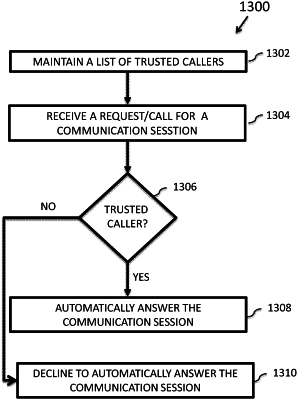| CPC H04L 65/1096 (2013.01) [H04L 9/0894 (2013.01); H04L 65/1076 (2013.01); H04L 65/403 (2013.01); H04L 67/306 (2013.01); H04L 2209/34 (2013.01)] | 20 Claims |

|
1. An apparatus, comprising:
a processor; and
a memory configured to store code executable by the processor to:
maintain a list of trusted callers that is encoded in the memory, the list of trusted callers including fully trusted callers and less trusted callers,
in response to receiving a communication session from a caller, determine whether the caller is included in the list of trusted callers,
in response to determining that the caller is included in the list of trusted callers:
automatically answer a first communication session received from a fully trusted caller in the encoded list of trusted callers without receiving input from a user accepting the first communication session, and
semi-automatically answer a second communication session received from a less trusted caller in the encoded list of trusted callers by forwarding the second communication session to a user to enable the user to manually accept or reject the second communication session, and
in response to determining that the caller is not included in the list of trusted callers:
determine whether the caller is included in a log of previously accepted communication sessions,
semi-automatically answer a third communication session received from a caller included in the log of previously accepted communication sessions by forwarding the third communication session to a user to enable the user to manually accept or reject the third communication session, and
automatically decline a fourth communication session received from the caller not included in the log of previously accepted communication sessions without receiving input from the user declining the fourth communication session,
wherein encoding the list of trusted callers in the memory protects the encoded list of trusted callers from being modified by an unauthorized third party.
|